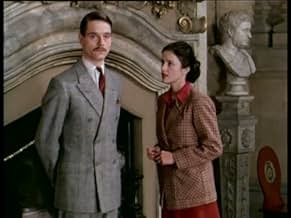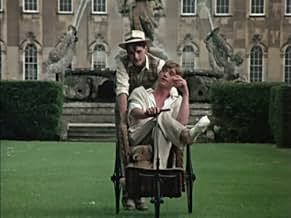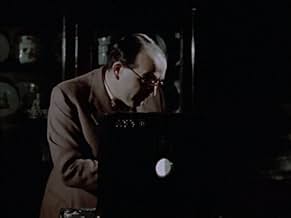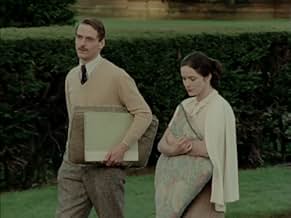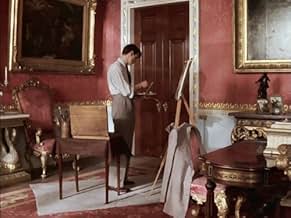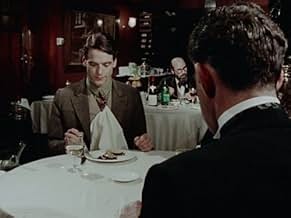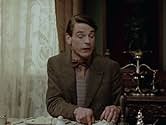अपनी भाषा में प्लॉट जोड़ेंThe life, friendships and romances of the protagonist Charles Ryder-including his friendship with the Flytes, a family of wealthy English Catholics who live in a palatial mansion called Brid... सभी पढ़ेंThe life, friendships and romances of the protagonist Charles Ryder-including his friendship with the Flytes, a family of wealthy English Catholics who live in a palatial mansion called Brideshead Castle.The life, friendships and romances of the protagonist Charles Ryder-including his friendship with the Flytes, a family of wealthy English Catholics who live in a palatial mansion called Brideshead Castle.
- 1 प्राइमटाइम एमी जीते
- 13 जीत और कुल 19 नामांकन
एपिसोड ब्राउज़ करें
फ़ीचर्ड समीक्षाएं
Brilliantly adapted by John Mortimer from Evelyn Waugh's celebrated novel of England between the first and second World Wars, BRIDESHEAD REVISITED may be the best miniseries ever made. Smoothly and subtly directed by Charles Sturridge and Michael Lindsay-Hogg, the twelve hour program is beautiful to look at, the cast is remarkable, and the story has amazing impact.
The miniseries follows the novel closely, beginning near the end of World War II as Charles Ryder (Jeremy Irons) grows disdainful of military life, which he finds a study in futility--and then flashes back twenty years as Ryder recalls his relationship with the aristocratic Marchmain family, a relationship that begins when he becomes friendly with Marchmain son Sebastian Flyte (Anthony Andrews) while the two are students at Oxford.
The miniseries captures perfectly a golden moment of youth--and then the gradual disillusionment brought by the passage of time. Like all great works, BRIDESHEAD REVISITED--both book and film--touches on a great many themes, most specifically an innocent type of homoeroticism, loss of innocence, alcoholism, adultery, and changing society; ultimately, however, the story is about spiritual values and how they survive in even the most unlikely of circumstances--and how God works through individuals in the most unexpected ways.
The performances here are truly fine beyond description. Jeremy Irons has seldom surpassed his work here, and neither Anthony Andrews nor Dianna Quick (as Julia, Sebastian's sister) have ever bested their performances in this film. In addition to the three leads, the miniseries offers an incredible array of superior performances by John Gielgud, Claire Bloom, and Laurence Olivier; the cinematography and art design is flawless; and the score by Geoffrey Burgon is exquisite. Mortimer's script is remarkable in that it not only manages to recreate the novel, it also manages to capture the intangible, spiritual elements upon which the book plays but seldom directly references. A must-own work for any one who appreciates the best of the best; strongly, strongly recommended.
Gary F. Taylor, aka GFT, Amazon Reviewer
The miniseries follows the novel closely, beginning near the end of World War II as Charles Ryder (Jeremy Irons) grows disdainful of military life, which he finds a study in futility--and then flashes back twenty years as Ryder recalls his relationship with the aristocratic Marchmain family, a relationship that begins when he becomes friendly with Marchmain son Sebastian Flyte (Anthony Andrews) while the two are students at Oxford.
The miniseries captures perfectly a golden moment of youth--and then the gradual disillusionment brought by the passage of time. Like all great works, BRIDESHEAD REVISITED--both book and film--touches on a great many themes, most specifically an innocent type of homoeroticism, loss of innocence, alcoholism, adultery, and changing society; ultimately, however, the story is about spiritual values and how they survive in even the most unlikely of circumstances--and how God works through individuals in the most unexpected ways.
The performances here are truly fine beyond description. Jeremy Irons has seldom surpassed his work here, and neither Anthony Andrews nor Dianna Quick (as Julia, Sebastian's sister) have ever bested their performances in this film. In addition to the three leads, the miniseries offers an incredible array of superior performances by John Gielgud, Claire Bloom, and Laurence Olivier; the cinematography and art design is flawless; and the score by Geoffrey Burgon is exquisite. Mortimer's script is remarkable in that it not only manages to recreate the novel, it also manages to capture the intangible, spiritual elements upon which the book plays but seldom directly references. A must-own work for any one who appreciates the best of the best; strongly, strongly recommended.
Gary F. Taylor, aka GFT, Amazon Reviewer
Simply enchanting. Waugh's excellent use of English in recounting the story of the doomed Marchmain family is brought to life without losing one iota of its charm and power. I doubt that anyone will be able to imagine anyone other than Anthony Andrews as Sebastian or Nikolas Grace as Anthony Blanche; Jeremy Irons gives a well-rounded performance, Diana Quick is suitably gorgeous and a host of great English actors (Gielgud, Olivier et al) lend support to a fantastic script and excellent direction. See this.
The adaptation is so good that one can read Waugh's novel while watching and practically not miss a word. The lush prose of the novel is there, as well as perfect visual imagery of the settings, absolutely essential to the integrity of the piece.
Evelyn Waugh's 'Brideshead Revisited' is, I think, the quintessential and the finest novel of the twentieth century - English literature at its highest form. And this 1981 miniseries does the novel great justice: its episodes give us television's finest hours.
The splendid cast makes the most of the rich script, which is as faithful to a novel as a script can be. My favorite is Phoebe Nicholls as Lady Cordelia: her performance is disarming, utterly charming. And Nickolas Grace plays to the hilt the sybaritic, viper-tongued Anthony Blanche.
Jeremy Irons does sterling service as the narrator, Charles Ryder, who is, after all, Waugh's observant eye and eloquent tongue; Irons depicts poignantly Ryder's "conversion to the Baroque" crashing to bits against the cold gracelessness of "The Age of Hooper". As the rapidly dissolving Lord Sebastian Flyte Anthony Andrews is memorable - should Waugh's book ever again be adapted for the screen the lot of the actor cast as Sebastian will not be enviable.
Claire Bloom's Lady Marchmain is a study in quiet dignity upheld vainly in the face of the twentieth century's ravaging of her character's world and sensibilities. Sir Laurence Olivier's Lord Marchmain is letter-perfect; and in the deathbed sequences Olivier's performance is tenderly, expertly nuanced.
Diana Quick was a bit too old to play convincingly the debutante Lady Julia of the early episodes, but in the later ones Quick hits perfectly every disillusioned, jaded, repentant note. Charles Keating as Rex, who inhabits a "harsh acquisitive world", is an exemplar of shallowness, of the venality Waugh detested - and satirized so hilariously in his earlier novels: he's nothing more than a Hooper with money and ambition.
Simon Jones gives us Bridey's stodginess and bewliderment with marvelous understatement. John Gielgud steals every scene as Charles's father Edward, brilliantly interpreting of one of Waugh's most delicious, yet indigestible characters.
There are rich offerings, too, from character actors: Stephane Audran glows warmly as Clara, Lord Marchmain's insightful, intuitive, down-to-earth mistress; John LeMesurier leaves us suitably agape as the Jesuit Father Mowbray baffled and dismayed by Rex's utilitarian approach to his conversion to Catholicism; Jeremy Sinden sails naively along as the indefatigable yet ever-dimwitted and clueless Boy Mulcaster; Ronald Fraser stirs just the right sloshing of queasiness as the peculiar, opportunistic shipboard cocktail party guest; Jonathan Coy, as the parlous, seedy Kurt, is perfectly repellent; Jane Asher tiptoes delicately through Celia Ryder's conventional, porcelain sensibilities; and Mona Washbourne knits a thoughtful, lovely portrait of Nanny Hawkins.
Throughout 'Brideshead Revisited' the photography is lush, meticulous, yet tasteful. The score is understated, never intrusive, always complementary. Costuming, set design and, above all, location, are unrivalled. Charles Sturridge's direction is evenhanded, assured - and his pacing of the narrative treads adroitly every beautifully-modulated beat.
I bought the DVD version of this series and, though occasional bits of the image transfer are a trifle fuzzy and the sound re-recording is sometimes uneven, the nicely boxed set of discs pleased - and goes on pleasing - me greatly.
In the early third millennium, a time of evermore immature programming and production executives - a dismal age of TV's Hoopers, I have to suspect sadly that television will never again attain the heights to which 'Brideshead Revisited' vaulted. But I shall remain ever grateful for this magnificent series.
The splendid cast makes the most of the rich script, which is as faithful to a novel as a script can be. My favorite is Phoebe Nicholls as Lady Cordelia: her performance is disarming, utterly charming. And Nickolas Grace plays to the hilt the sybaritic, viper-tongued Anthony Blanche.
Jeremy Irons does sterling service as the narrator, Charles Ryder, who is, after all, Waugh's observant eye and eloquent tongue; Irons depicts poignantly Ryder's "conversion to the Baroque" crashing to bits against the cold gracelessness of "The Age of Hooper". As the rapidly dissolving Lord Sebastian Flyte Anthony Andrews is memorable - should Waugh's book ever again be adapted for the screen the lot of the actor cast as Sebastian will not be enviable.
Claire Bloom's Lady Marchmain is a study in quiet dignity upheld vainly in the face of the twentieth century's ravaging of her character's world and sensibilities. Sir Laurence Olivier's Lord Marchmain is letter-perfect; and in the deathbed sequences Olivier's performance is tenderly, expertly nuanced.
Diana Quick was a bit too old to play convincingly the debutante Lady Julia of the early episodes, but in the later ones Quick hits perfectly every disillusioned, jaded, repentant note. Charles Keating as Rex, who inhabits a "harsh acquisitive world", is an exemplar of shallowness, of the venality Waugh detested - and satirized so hilariously in his earlier novels: he's nothing more than a Hooper with money and ambition.
Simon Jones gives us Bridey's stodginess and bewliderment with marvelous understatement. John Gielgud steals every scene as Charles's father Edward, brilliantly interpreting of one of Waugh's most delicious, yet indigestible characters.
There are rich offerings, too, from character actors: Stephane Audran glows warmly as Clara, Lord Marchmain's insightful, intuitive, down-to-earth mistress; John LeMesurier leaves us suitably agape as the Jesuit Father Mowbray baffled and dismayed by Rex's utilitarian approach to his conversion to Catholicism; Jeremy Sinden sails naively along as the indefatigable yet ever-dimwitted and clueless Boy Mulcaster; Ronald Fraser stirs just the right sloshing of queasiness as the peculiar, opportunistic shipboard cocktail party guest; Jonathan Coy, as the parlous, seedy Kurt, is perfectly repellent; Jane Asher tiptoes delicately through Celia Ryder's conventional, porcelain sensibilities; and Mona Washbourne knits a thoughtful, lovely portrait of Nanny Hawkins.
Throughout 'Brideshead Revisited' the photography is lush, meticulous, yet tasteful. The score is understated, never intrusive, always complementary. Costuming, set design and, above all, location, are unrivalled. Charles Sturridge's direction is evenhanded, assured - and his pacing of the narrative treads adroitly every beautifully-modulated beat.
I bought the DVD version of this series and, though occasional bits of the image transfer are a trifle fuzzy and the sound re-recording is sometimes uneven, the nicely boxed set of discs pleased - and goes on pleasing - me greatly.
In the early third millennium, a time of evermore immature programming and production executives - a dismal age of TV's Hoopers, I have to suspect sadly that television will never again attain the heights to which 'Brideshead Revisited' vaulted. But I shall remain ever grateful for this magnificent series.
10curt-28
It is exceptional to find something in life that improves with age. Brideshead Revisited is one of those exalted things. Having just completed watching the entire series I can say that it is actually better than I remembered when I first saw it over 15 years ago. Seldom do so many things (cast, writing, locations, costumes) come together and form a harmonious whole. Brideshead is a tour-de-force of the film maker's art that glows with a magical intensity all its own.
क्या आपको पता है
- ट्रिवियाOriginally, producer Derek Granger asked Anthony Andrews to play the role of Charles Ryder. Andrews, however, felt he was better suited for the part of Sebastian Flyte. Jeremy Irons, Granger's first choice for Sebastian, preferred to play Ryder, so the two actors swapped roles.
- इसके अलावा अन्य वर्जनThe voiceover in the early Venice sequences was added for the American version after producer Derek Granger saw the initial British broadcast and felt there was not a strong enough sense of the religious feelings evoked while viewing the paintings.
- कनेक्शनFeatured in The 34th Annual Primetime Emmy Awards (1982)
टॉप पसंद
रेटिंग देने के लिए साइन-इन करें और वैयक्तिकृत सुझावों के लिए वॉचलिस्ट करें
विवरण
- रिलीज़ की तारीख़
- कंट्री ऑफ़ ओरिजिन
- भाषा
- इस रूप में भी जाना जाता है
- Wiedersehen mit Brideshead
- फ़िल्माने की जगहें
- Castle Howard, Henderskelfe, York, North Yorkshire, इंग्लैंड, यूनाइटेड किंगडम(Brideshead Castle: exterior and some interiors)
- उत्पादन कंपनी
- IMDbPro पर और कंपनी क्रेडिट देखें
इस पेज में योगदान दें
किसी बदलाव का सुझाव दें या अनुपलब्ध कॉन्टेंट जोड़ें





